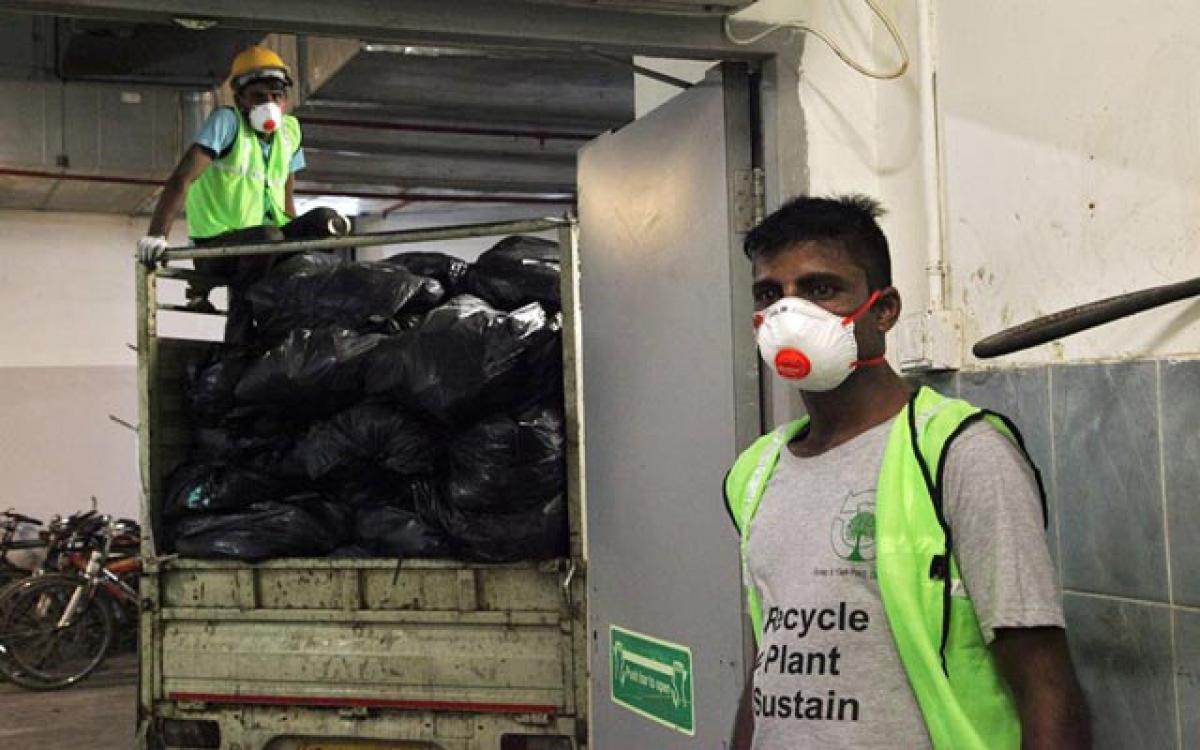Live
- GMR Airports Unveils AI-Powered Digital Twin Platform to Transform Airport Operations
- India poised to become leading maritime player: PM Modi
- Top Causes of Kidney Stones and How to Recognize Silent Symptoms
- India’s renewable energy capacity logs 14.2 pc growth at 213.7 GW
- Winter Session of Odisha Assembly adjourned sine die
- Biden calls Trump's tariff approach 'major mistake'
- After Drama Over Eknath Shinde’s Chief Minister Race, Maharashtra Cabinet Formation Faces New Tensions
- Egyptian FM, Blinken discuss recent developments in Syria
- Iran's supreme leader says Syria's developments result of US-Israeli 'plot'
- Elon Musk to Purchase $100 Million Luxury Mansion Next to Donald Trump's Mar-a-Lago, Report Reveals
Just In

A new business in India offering environmentally-friendly rubbish disposal, ScrapApp, has boomed in the past year while helping address one of the nation\'s major problems garbage.
Noida : A new business in India offering environmentally-friendly rubbish disposal, ScrapApp, has boomed in the past year while helping address one of the nation's major problems garbage. In India, where recycling rubbish is not part of the formal sector, masked workers from social enterprise ScrapApp sift through mounds of rubbish daily at India's largest mall, DLF Mall ofIndia, separating recyclable trash from other waste.
The mall contract is the jewel in the crown for the year-old start-up, one of a growing number of social enterprises in India which are seeking funds to create businesses with a mission to tackle social problems. A Thomson Reuters Foundation poll of nearly 900 experts on the best countries for social entrepreneurs found access to investment was one of the key challenges in the growing sector.
But India was one of the countries where it was easiest to access investment, coming behind Canada, Singapore, the United States, and Belgium. ScrapApp's CEO Vidhur Bakshi, 27, said overseas may be the best place to seek funds to have an impact in India where one-third of the 1.3 billion population live below the poverty line and garbage pollutes streets and rivers and spreads disease.
"There are sources of funding within India, but it is not easy, most people want a quick return," said Bakshi, who started ScrapApp in September 2015 with three colleagues. "There are a lot possibilities if we explore sources of finance overseas." The poll, carried out in partnership with Deutsche Bank, the Global Social Entrepreneurship Network (GSEN) and UnLtd, foundations for social entrepreneurs, surveyed social entrepreneurs, academics investors and support agencies in the world's 45 biggest economies as ranked by the World Bank.
The survey found the difficulty in accessing funds was compounded by a lack of public awareness about the work of social entrepreneurs who can run for-profit or non-profit businesses which try to drive social change. While there are growing sources of capital within India, many entrepreneurs say it is easier to scout for funds in countries with better recognition of social entrepreneurship. The poll, conducted between June 9 and July 15, found none of the experts questioned in India thought the general public understood the sector.
In the last decade, thousands of Indian start-ups have pioneered ideas to help people access services from water and sanitation, education and health to housing and training. With this growth, the challenge of finding capital has eased, say experts, with venture capital funds, angel investors, individuals and corporates all looking to invest in the sector. Anurag Agrawal, CEO of Intellecap, a successful social enterprise which invests in start-ups, said there are a list of impact focused funds looking for dual return on investments.
"If they have a strong commercial case and a solid team behind the business, then there will be no dearth of capital," he said. Social entrepreneurs say investors in countries such as United States, Singapore and in Europe, are hungry to provide finance to development-focused start-ups in India. There are also foundations, multinational and philanthropic organisations such as the World Bank, Rockefeller and Dell foundations which offer grants to help social enterprises grow.
Prashanth Venkataramana, head of operations of Essmart Global, which brings innovative products such as solar lanterns and rechargeable batteries to mud-and-brick villages, knows only too well where the capital lies. The company, registered both in the United States and India, has been much more successful at raising funds through its US entity, which has brought in 70 percent of its funding. "A lot of people see India as an opportunity overseas, especially in America," said Venkataramana.
"In India, people either want to do charity or expect very short-term unreasonable returns - they either donate money to a temple or expect their money back within a week." Entrepreneurs say no official recognition of the sector by the Indian government means social enterprises are not entitled to concessions such as tax breaks, unlike in other countries where development focused start-ups get incentives.
By Nita Bhalla

© 2024 Hyderabad Media House Limited/The Hans India. All rights reserved. Powered by hocalwire.com







